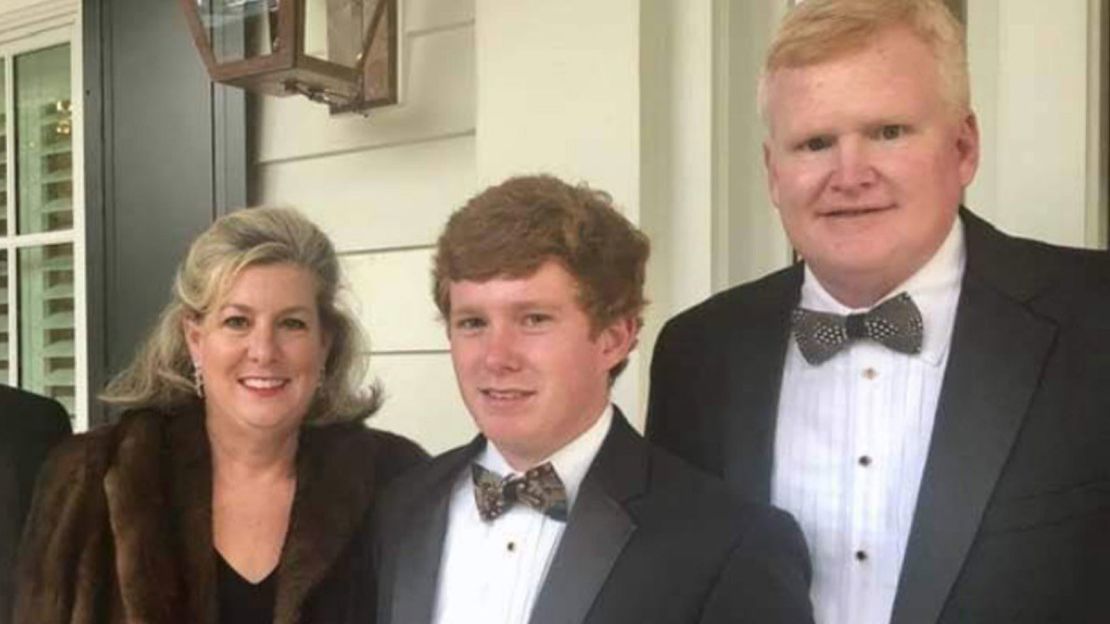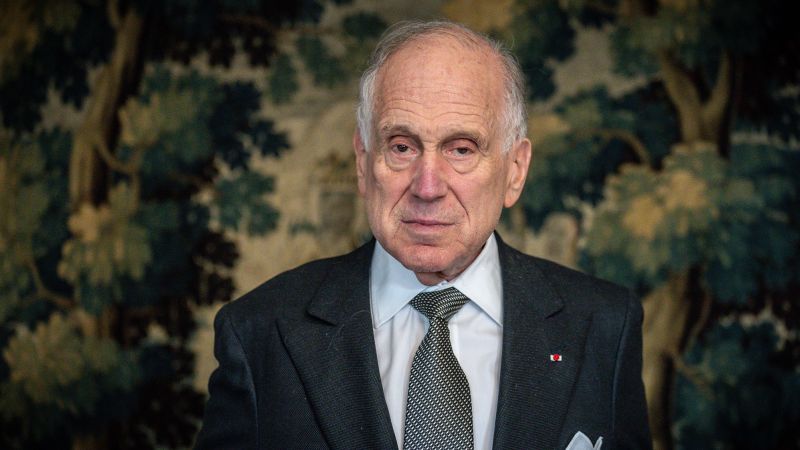CNN
—
A mother who shielded her son from gunfire, a “pro-peace” academic, young people who attended a musical festival and two brothers are among at least 30 Americans who have been killed in the warfare between Israel and Hamas, family members and officials say.
Rotem Matias, a 16-year-old Israeli American, told CNN his parents wanted he and his sisters to be happy and whimsical.
“They wanted us to be joyful. They wanted us to be in peace,” Rotem said of his mother, who died as she put herself between him and the terrorists, and his father, who was also killed.
“Mom and Dad, they sacrificed their lives to save me,” Rotem Matias told CNN’s Poppy Harlow.
Rotem is recovering from a wound to his abdomen.
Others who died included brothers Igal Wachs, 53, and Amit Wachs, 48, who were killed when Hamas gunmen stormed their village of Netiv HaAsara, which borders Gaza, Igal’s ex-wife Liat Oren-Wachs told CNN.
Both were dual Israeli-American citizens and members of the village’s security team, said Oren-Wachs, who believes the pair were killed trying to defend their community. Amit had lived in Netiv HaAsara all his life and leaves behind a wife, two daughters and a son, Oren-Wachs said.
“They were both very family oriented,” she said.
The brothers are among the US citizens who were killed after the Gaza-based militant group launched a devastating attack on Israel early October 7 that left at least 1,400 dead.
The number of Americans dead in Israel after the Hamas attack has reached 30, a US State Department spokesperson said Sunday. Another 13 Americans are unaccounted for, down by two people since Saturday, the spokesman said.
Israeli-American Daniel Ben Senior, 34, who attended Nova music festival near the Gaza-Israel border, is also among the dead, her father Jacob Ben Senior told CNN.
She had been working with a group of event organizers at the festival, which was supposed to be an all-night dance party to celebrate the Jewish holiday of Sukkot. But the festival turned into a scene of carnage when Hamas gunmen attacked, killing at least 260 people.
In response to the attacks, Israel has pounded Gaza with airstrikes. At least 2,600 people have been killed in Gaza, including at least 447 children, according to the Palestinian Health Ministry. More than 9,600 others have been wounded.
Medical care has been hampered by Israel cutting power to Gaza. It’s unclear whether any US citizens are among those killed or injured in Gaza.
As families in the US wait for information about their missing loved ones, others are confronted with the sudden loss of siblings, children or parents.
Here is what we know about some of the Americans who have died in Israel.
Adrienne Neta, a 66-year-old US citizen who was reported missing from Kibbutz Be’eri after an attack by Hamas, is among the deceased.
Her son, Nahar Neta, told CNN that Israeli authorities have given the family DNA confirmation for her body, but said he has no information about the circumstances of her death.
Adrienne Neta was on the phone with her children, who were trying to calm her down as she heard gunfire outside her home when terrorists burst into her home, Nahar Neta said at a news conference last week.
Rotem Matias’ mother, Deborah, was killed by Hamas while she was on the phone with her father, according to family members.
Rotem was shot in the stomach with one of the bullets that hit his mother and is expected to survive. “The brunt of the shot was borne by his mother,” said Ilan Troen, a professor emeritus from Brandeis University in Massachusetts.
Troen said family members were on the phone with Deborah when she was killed.
The terrorists used explosives to get in the front door and blast open the door to their safe room, Troen said.
At first Rotem lay under her body then he hid under a blanket in the laundry.
Rotem hid for more than 12 hours after he was shot, texting on his phone to communicate with people who were coaching him on how to breathe and how to manage “the blood that was coming out of his abdomen,” Troen said, adding Rotem’s phone was down to a 4% charge when he was rescued.
Deborah Matias attended the Rimon School of Music in the Tel Aviv area, where she met her husband, Troen told CNN. “Deborah was a child of light and life,” Troen said. “She, rather than becoming a scientist or a physician, she said to me one day, ‘Dad, I have to do music, because it’s in my soul.’”
Rotem told CNN he is keeping the bullet saying, it will be a memory that will help him never forget them.
“They won’t die there,” he added. “They won’t die. They will live on in memories and in stories.”
Hayim Katsman was “very pro-peace” and had supported “a solution for this bleeding conflict” between Israel and Palestinians before he was killed, his sibling told CNN.
Noy Katsman – who is non-binary and uses they/them pronouns – said they last heard from their brother Saturday morning when he wrote to say there were terrorists in Kibbutz Holit, which is in southwest Israel near Gaza.
When they tried to reach their brother again about four hours later, there was no response.
Hayim Katsman’s friend, Avital Alajem, described how she was hiding inside a shelter’s closet with Katsman when gunmen came and began firing at the door – striking Katsman multiple times.
“He was murdered,” Alajem told CNN’s Anderson Cooper in Israel early Tuesday. “I was saved because he was next to the door, and they shot him.”
Katsman, who was a US citizen, was remembered by his sibling as a “brilliant academist,” a musician who DJ’d and played bass, and a volunteer at the community garden in the city of Rahat.
He earned his PhD in international studies from the University of Washington’s Henry M. Jackson School of International Studies in 2021 and was described as “an emerging scholar in the field of Israel Studies,” in a statement issued by the Association for Israel Studies.
Noy Katsman told CNN they hoped their brother’s death will not be used “as an excuse to kill other innocent people,” adding: “He wouldn’t have wanted that.”
Israeli-American Roey Weiser was killed during Saturday’s attack, his mother, Naomi Feifer-Weiser, told CNN.
Weiser, 21, was a sergeant who served in the 13th Battalion of the Golani Brigade and was stationed at the Kerem Shalom border crossing, his mother said.
“He died how he lived, by putting others first, and when his base was overrun by terrorists, he went on his own to divert their attention allowing others to escape. Because of his bravery, at least 12 other soldiers are alive today,” Weiser’s mother said.
She said the family was finally able to retrieve her son’s body three days after the attack. The funeral was held the next day.
“Roey lived his life to the fullest, almost always with a smile on his face,” the mother said. “He was always looking for ways to help those around him, and before he was conscripted he was a volunteer firefighter who was always the first to jump into action when needed.”
Though Weiser’s parents were born and raised in the US, they now live in Israel.
A 20-year-old New Jersey-born, Israeli soldier died in the attacks, his relatives told CNN.
Earlier this week, the parents of Itay Glisko were visited at their home by soldiers who told them their son was dead, according to Rachel Glisko, Itay’s aunt who lives in Los Angeles.
His parents had been waiting for days to hear “any shred of evidence” of their son’s whereabouts, the aunt said, but “nobody knew what was going on with him.”
Rachel Glisko said her nephew fought like a “lion” against Hamas until the end.
“Since yesterday, we can’t stop crying. I don’t believe it, can’t believe it,” she said. “He took care of them, he was fighting and was taking care of his fellow soldiers who got wounded.”
His aunt described him as kind and generous and said he “didn’t complain about anything in the army.”
“He was really a fighter. He fought for Israel,” she added.
His parents and family are devastated.
“He’s only 20 years old. He’s not going to have girlfriend, not going to have kids, not going to have a wedding. It’s done,” she said through tears. “This family have (a) big hole in hearts, not going to recover from that.”
Aryeh Shlomo Ziering, a 27-year-old dual Israeli-American citizen, was killed in Israel, his aunt Debby Ziering confirmed to CNN.
He was a captain in the Israeli Defense Forces’ dog-handling unit.
Ziering’s parents, who are from New York and Maine, moved to Israel after getting married. Although he was born and raised in Israel, Ziering attended summer camp in the United States and grew up speaking English with his parents, his aunt said.
Debby Ziering also told CNN that Aryeh grew up not wanting to be a soldier, but “when my nephew does something, he does it 200%. And he was very passionate about protecting his country.”
She remembers him as a “fun-loving, athletic, great kid.”
Danielle Waldman, who was born in Palo Alto, California, was attending the music festival in Israel with her boyfriend of six years when they both were killed, her father Eyal Waldman told CNN’s Erin Burnett.
“I had hoped and thought that they may have been taken hostages to Gaza and that we would see them again,” he said.
Eyal Waldman found out just hours before speaking to CNN that his daughter was among those killed. Danielle was his youngest daughter.
“Each and every one that met her have loved her,” Eyal tearfully recalled. “She’s done nothing wrong and nothing bad to anyone.”
He said the last time he spoke with his daughter she mentioned she had decided with her boyfriend that they would get married soon. The two had just moved into a new apartment several weeks before they were killed with a dog they share, and they had refurnished and redecorated it.
“We will bury them together,” her father said.
Cindy Flash, 67, was a dual citizen and a native of St. Paul, Minnesota. Her husband, Igal Flash, 66, was born in Israel, the son of Holocaust survivors.
The couple are among the dozens killed in one of the grisliest scenes emerging from the Hamas attack on Israel, their daughter, Keren Flash, told CNN.
Keren, 34, said she learned her parents were killed in the safe room of their home in Kfar Aza, a southern Israel kibbutz close to the Israeli-Gaza border – a home they moved back into just a week before their deaths.
“The last message my mom sent was at 4:59 p.m. on Saturday, and she said, ‘They’re breaking into the house,’” Keren said.
Three minutes later, Cindy Flash texted attackers had broken into the safe room.
“That was the last time anyone heard from them,” Keren said.
She described her mother as “all heart and soul.” Her father, Igal, was the strong and silent type with a sweet soul, Keren said.
Keren told CNN her mother had unwavering hope in humanity, even protesting Israeli military action in Gaza.
“They were some of the best people that I have ever known,” Keren said. “They were good people. They cared about other people. They fought for other people’s rights and other people’s voices.”
Jonathan Rom, an Israeli-American, was killed in the Hamas attack on the Nova music festival, his family said.
Rom’s cousin, Daniel Zaken, told CNN that Rom was attempting to help a young woman escape when he encountered heavy gunfire.
Rom, who was born in South Carolina, had lived in Israel for several years, Zaken said.
“It’s just helplessness,” Zaken told CNN. “It’s just unbelievable that they’ve been even able to do something like this.”
Israel resident Ranae Butler said her family was once a “big, beautiful tribe.”
The attack by Hamas on the Nir Oz kibbutz changed everything. “Half our family is gone,” Butler said in an interview with “CNN News Central.”
Six relatives, including at least five US citizens, were among the residents killed by Hamas near the Gaza Strip, according to Butler.
Nir Oz, close to the site of the Nova music festival, was among the worst hit of the kibbutzim near Gaza, with scores of residents killed or taken hostage.
Butler’s mother, Carol Siman Tov, 70, and her brother, Johnny Siman Tov, 36, texted her after they fled to safe rooms at their separate houses on the kibbutz during the attack, Butler said.
Johnny and his wife, Tamar Kedem-Siman Tov, 35, hid with their three children – twins Arbel and Shachar, 5, and Omer, 2 – Butler said.
Butler’s mother fled home with her dog, Charlie. Johnny texted Butler, saying, “‘They’re here. They’re burning us. We’re suffocating,’” Butler said.
Johnny and his wife were shot through a window, and Butler’s mother was shot to death in her own safe room, Butler said.
Carol, Johnny and the three children were US citizens, according to Butler. Tamar’s citizenship wasn’t immediately clear.
Several other family members living at Nir Oz survived the attack, Butler said, including two of her brothers, two sisters and her father, Larry Butler, also US citizens. She said her brother Shachar Butler, who was head of security for the kibbutz, was shot but is recuperating.
“They barely put on their boots and pants, and ran and fought in bravery,” Butler said.
“We’re crying and hugging,” she said. “They’ve all been through hell.”
A young man who loved nature and wanted to be a DJ
Twenty-year-old Laor Abramov’s dream was to be a DJ like his father, David.
The permanent resident of the US was killed in last weekend’s attack on Israel by Hamas, his mother, Michal Halev, told CNN.
“This was our worst nightmare,” Halev said, after getting word of his death.
Abramov was attending a nature party with his friends when his family lost contact with him.
His parents shared a photo of him in a shelter with CNN. They believed he was hiding out in a border city near Gaza.
“We have been calling and texting and emailing and just sending photos on social media and asking everyone we know,” Abramov’s mother had told CNN’s Poppy Harlow.
Laor loved being in nature with his friends, his mother said.
Yannai Kaminka, a dual Israeli-American citizen who was born and raised in Israel, died there while fighting on the front lines, his mother, Elana Kaminka, told CNN on Monday.
The 20-year-old was stationed on a base in southern Israel, near Gaza, when the attacks began on October 7. After an hour of fighting, Kaminka and five officers were killed, according to Kaminka’s mother, but they saved more than 90 others and succeeded in stopping Hamas militants from attacking a nearby kibbutz.
Most of the young trainees at the base were saved by Kaminka and his colleagues, his mother said.
Kaminka’s mother said her son was always focused on helping other people. He was a Scouts counselor, a volunteer with at-risk youth and later served as a soldier in the Israel Defense Forces, she said.
He would have turned 21 on October 30, she said.
Elana Kaminka said she was not surprised her son put himself on the front lines.
“He saw himself as the person who needs to protect other people and who takes responsibility for other people, and that was a line that went through him throughout his life,” she said.
The family last spoke to Yannai Kaminka the day before he died. They were supposed to visit him on Saturday, the day of the attacks, his mother said.
“None of us could have imagined in our worst nightmares that he would be on the front line in this war, protecting other people’s lives and keeping other people safe behind him,” Elana Kaminka said.
“We lost the most important thing to us,” his mother said. “The idea of more lives lost just tears me apart because I know what it means to lose your child.”
Correction: An earlier version of this story overstated the number of American citizens confirmed killed in Israel.
Correction: An earlier version of this story misspelled Daniel Ben Senior’s first name.






























